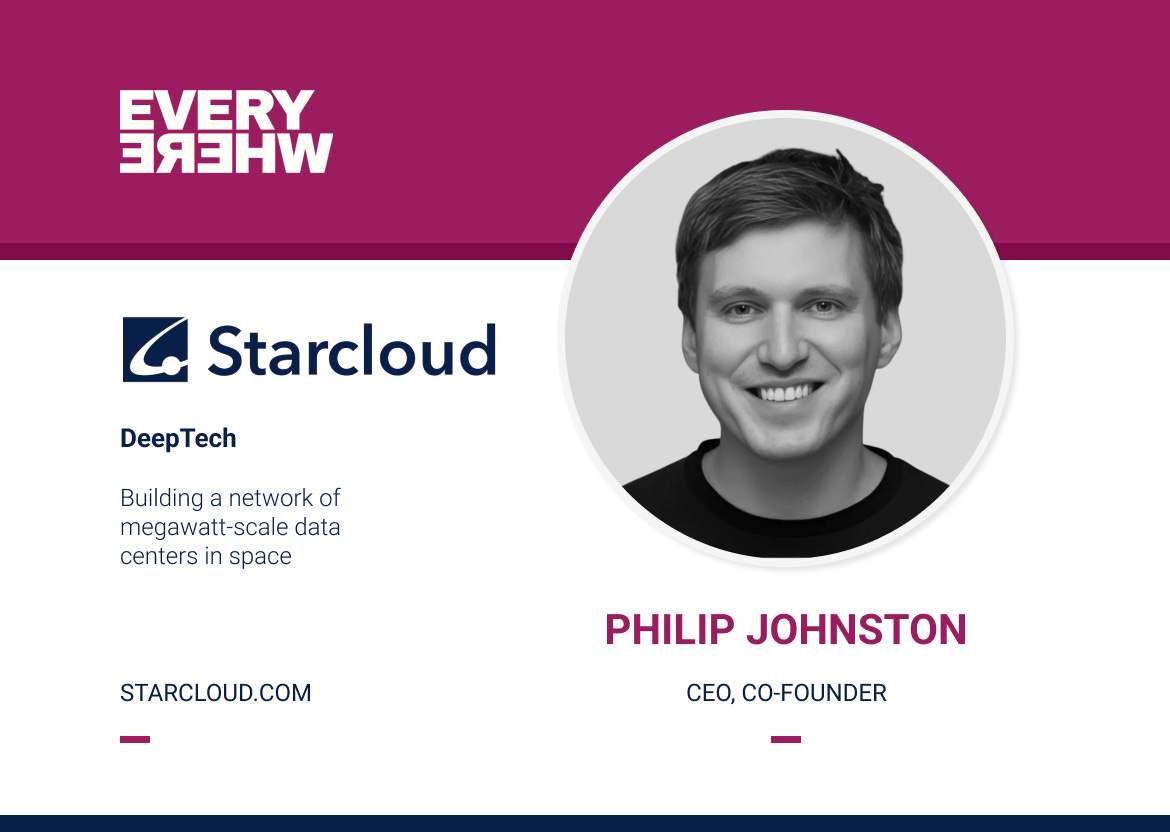Founders Everywhere: Philip Johnston
Philip Johnston is the co-founder and CEO of Starcloud, a company building data centers in space to address the AI energy challenge.
Welcome to Founders Everywhere, where we highlight the incredible people behind the companies we’ve backed at Everywhere Ventures, a global pre-seed fund supported by a community of 500 founders and operators.
“Building data centers in space” may have once sounded like science fiction, but it’s now becoming a reality with Starcloud. Sending hardware to orbit hasn’t been easy, and until recently, it was prohibitively expensive. Just a decade ago, launch costs were around $60,000 per kilogram and now they’re approaching $400/kilo and continuing to fall. This dramatic shift is opening the door (or should we say hatch) to entirely new possibilities in space-based infrastructure. Starcloud’s data centers will initially provide GPU compute to other satellites, and eventually help meet the rapidly growing energy demands driven by the rise of AI. Data centers in space will harness constant solar energy and natural radiative cooling, enabling rapid scaling to gigawatt capacity, without the land use or permitting constraints of Earth-based infrastructure.
Co-founder and CEO Philip Johnston began his career in engineering before moving into the commercial side, working at McKinsey on satellite projects for government space agencies. He identified the opportunity for space-based data centers as launch costs dropped, and quickly immersed himself in the deep tech space. To bring the vision to life, he partnered with CTO Ezra Feilden and Chief Engineer Adi Oltean, two of the most knowledgeable minds in the industry, giving Starcloud a strong and deeply rooted technical foundation. Ezra brings deep experience in spacecraft engineering, having led deployable payload systems at Oxford Space Systems and Airbus, and previously managed advanced R&D in aerospace composites at Parker Aerospace. Adi is a veteran engineering leader who worked at Microsoft for over 20 years (including 26 unique patents), developed in-orbit solutions at SpaceCrane, and helped deliver advanced Starlink features at SpaceX. Together, their powerful mix of technical depth, commercial insight, and operational experience is driving the creation of the first scalable, space-based data centers, built to meet the massive compute demands of the AI era.
What is Starcloud’s North Star?
Our North Star is solving the AI energy challenge at massive scale by building large data centers in space. It’s the only real pathway we see to achieve this.
Why is Starcloud going to win?
We're currently the only ones working to build very large data centers in space. There's a few companies that say they're building “data centers in space”, but they usually mean very low-powered edge processing for other satellites. While high-profile figures have talked about the concept, we're the only company that I know of that's actually working on doing this right now.
Tell us about a recent milestone that Starcloud has crushed.
We started about a year and a half ago and have already designed and built our first satellite, which is set to launch in a few months on SpaceX. It's going to have about 100 times more powerful GPU compute than has been in space before, including an H100 chip from Nvidia. It will be the first satellite to train models, run high-powered inference, fine-tune models, and operate an LLM (or like a version of LLaMA) in space.
What’s on the horizon for Starcloud?
Our second satellite will launch later next year in partnership with NVIDIA's Inception Program. It will be our first commercial offering, bringing significantly more compute power to orbit. It will provide edge AI services to other satellite constellations, processing raw data like imagery in orbit and sending down the insights. This will enable faster responses for applications such as real-time wildfire detection, natural disaster monitoring, and other military uses.
We've also received a lot of interest from high levels in government. For example, we’ve met with Senator Mike Rounds, current Chair of the House Armed Services Subcommittee on Cyber, who views large data centers in space as a matter of national security due to constraints on building new energy capacity in the US versus China.
What have been some of the greatest technical challenges founding Starcloud?
We’ve faced two main engineering challenges, with the team roughly split between them. The first is making chips that weren’t designed for space actually work in space, which involves tasks like radiation hardening and thermal management. The second is dealing with heat dissipation in a vacuum. Space is a vacuum and chips produce heat. Terrestrial data centers use cooling towers that keep chips cool by boiling fresh water. Since we can’t use that method in space, we’re working on large, lightweight, and low-cost deployable radiators to carry heat away from the chips and release it as infrared radiation into deep space.
Any favorite podcasts?
I really like listening to the Lex Fridman and Marc Andreessen podcasts.
Fun Fact:
I’m an identical twin and the youngest of five brothers.
Listen to Katie Hunt with Scott Hartley on the Venture Everywhere podcast: Pet Wellness with a Pawsitive Impact. Listen now on Apple & Spotify and check out to all our past episodes here!


